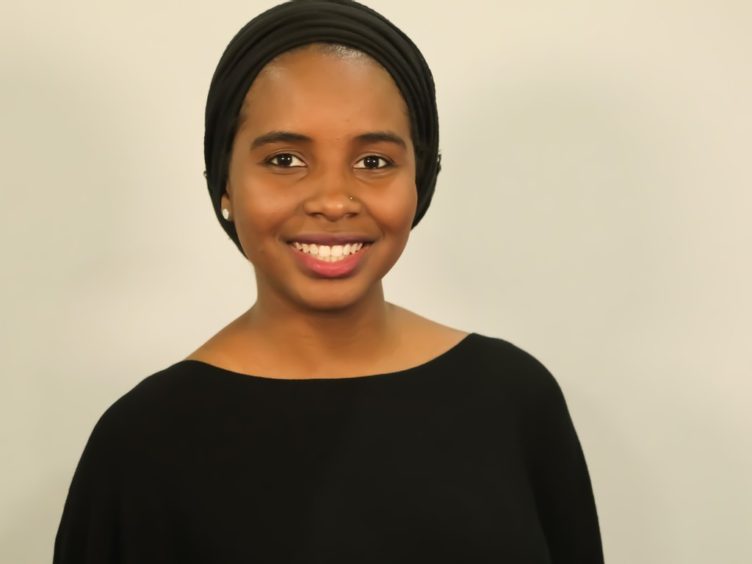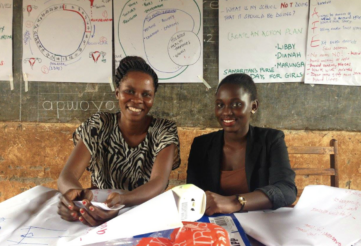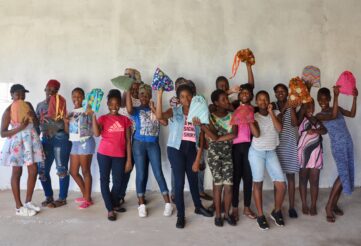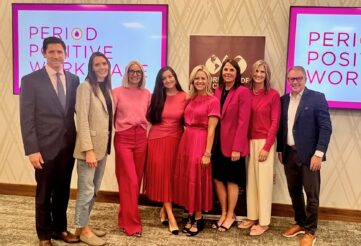Helping a Girl, Finding a Community

I stumbled upon Days for Girls in December through a flyer in one of the buildings at Tulane University, where I am pursuing my master's degree in public health. I was delighted to see this notice for a volunteering event, because I had been looking to get involved with a nonprofit organization that works on global women’s health and empowerment.
Menstrual health does not get much attention from the larger international community, but improving it is a crucial way to empower women. My passion for this issue stems from my experience growing up in northern Nigeria, where millions of people live below the poverty line. In my parents’ village, many women and girls struggled to live without proper menstrual hygiene products. Their anxious, uncomfortable, and insecure feeling about their bodies during their monthly cycles made it harder for them to perform even menial tasks around the house and in their community. It was also heartbreaking to witness their lack of privacy — having to wash their period rags and hang them to dry for neighbors and visitors to see. For young girls still figuring out who they were and what they wanted to do with their lives, this devastating display of their physical development marked them publicly as ready for marriage by the community.
These are just a few examples of the difficulties and pain girls endure on a monthly basis, when they don't have access to affordable and sustainable menstrual solutions. In developing parts of the world, especially in rural areas, periods are unfortunately one of many barriers that prevent women from climbing up the social ladder — leaving them uneducated and economically disadvantaged.
When I saw the DfG Kit design, I was really impressed. The fabrics are beautiful, don't need much water to clean, and last for up to three years. They are much more absorbent than rags, so girls don't have to be as worried about leaks. They are also more comfortable because unlike rags, the Days for Girls shields are buttoned on to the underwear, so even with a lot of movement, they stay in place. The fabric dries faster and is smaller than the rags used in my parents' village, so they don't need to hang it publicly for too long. Whether donated or sold at low cost by local women, these kits offer the perfect alternative to disposable sanitary pads or old rags for girls in rural parts of the world!
The first day I volunteered with the Days for Girls New Orleans Chapter was the happiest I had been in a while. Stuck in the routine of school, I forgot the reason I had chosen to get my master’s degree in public health — but that day, I was reminded why I had chosen this career path. It was very satisfying to know that the few hours I had taken out of my Saturday afternoon to cut, fold, and sew fabric was going to help girls in the developing parts of the world. And that was just the beginning! I went back to volunteer at the next session, and even took some friends along to help assemble the DfG Kits. With every step, I am that much closer to reaching another girl in need.
Not only does Days for Girls provide menstrual health solutions and education in rural parts of the world — we're also empowering girls in ways we could not even imagine. The DfG Kits, curriculum, and trainings encourage them to embrace their womanhood, break barriers, and pursue further education — leading to more opportunities for them, their families, and their communities.
My determination to help women in the developing parts of Nigeria is what drove me to pursue a degree in public health, with a concentration in health systems management. As someone privileged enough to travel to the United States for my education, my goal has been to empower women in Nigeria and other developing parts of the world, by helping break the many barriers that exist for them. I intend on doing this as a personal mission — through my career, as a mentor, and now as a volunteer with organizations like Days for Girls. Together as like-minded individuals, helping one girl at a time, we can change the world.
Farahat Bello is a graduate student at Tulane University, working toward her Master of Public Health degree.









